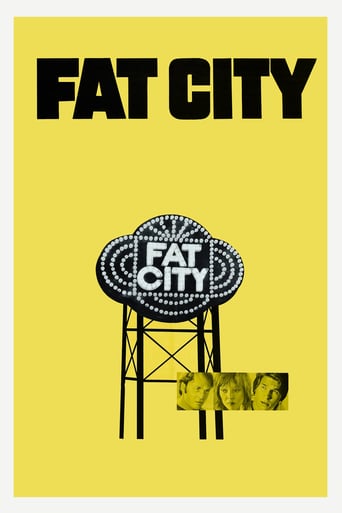
Life is hard for everyone. There are rarely any exceptions. Chances are you will get your heart broken at least once in life, and after a prolonged period of bitterness, pick yourself up off the floor, continue with your life. Some people are either not strong enough or supported enough to be able to rebound from the low points in their lives. A few motion pictures try to depict these people for what they are. People who have lost their way in life and are unable to overcome their problems. John Huston’s, “Fat City”, is a very insightful portrayal of these types of people.
The movie opens as a very lonely and somber man wakes up in his run-down one-room flat in Stockton, California. This is Bully Tully (Stacy Keach), who was once a professional boxer, now past his prime. In this opening scene, Tully steps outside of his building, sees the sun, makes an internal decision, and returns to his room to pick up his gym bag. Tully has decided to try and get his life back together by going to the local YMCA to work himself back into boxing shape. In this gym, he meets 18-year-old Ernie Munger (Jeff Bridges), who is also working out. They end up sparring together, impressing Tully, who then sends Munger over to the local boxing club, to speak with his former manager, Ruben (Nicholas Colasanto). Ruben is looking for a white fighter who can hold his own and accepts Ernie as a good prospect based on Tully’s words alone. From this premise, I expected the story to go in one of two directions. Either Tully gets redemption through the success of Munger, or some sort of “All about Eve”, scenario that concerns a younger man’s rise at the expense of the older man. Huston had other ideas about his movie, as he was more interested in the reality of not only the boxing industry, but in the harshness of life itself. He did not care about any rags-to-riches success story. Tully is really past his prime, and Munger does not have the drive of a champion, as there is no happy ending waiting for either man.
“Fat City” is a character study of losers, masquerading as a boxing film. Tully is supposed to be only 29 years old, and Keach, who was only 32 years old when he made the movie, looks much older. He sports a sad, world-weary look throughout the movie, which was perfect for the part. Huston originally wanted Marlon Brando to play Tully, and it was a lucky thing that Brando was not interested. He would have been much too old. Keach only looks older than Tully, so his young physical presence when added to his worn-out older appearance made him perfect for the part. As Tully, Keach gives a restrained performance that fits his character perfectly.
At this point of his career, Jeff Bridges, at 22 years old and with a baby face, was type-cast as a simple, confused teenager. His Ernie Munger is not that much different than his role in “The Last Picture Show”, from the previous year. Munger, has the physical skills to be a good boxer, but lacks the killer instinct and drive to destroy people in the ring. Throughout his initial boxing career, he gets his girlfriend pregnant, whom he marries, guaranteeing his future unexciting blue-collar working life. Boxing is just a painful hobby he was pushed into.
It is, however, Tully that the movie cares the most about, and is also the reason for the film’s extremely bleak tone. When he was a semi-successful boxer, Tully fell in love and got married to a woman that we are told left him once he started to lose his matches. After getting to know Tully through the movie, I understood that there were probably other reasons contributing to her leaving him. It is here that Huston gives us an understanding of how losing the women he loves destroyed Tully’s will to succeed. Drowning his sorrows in run-down bars, Tully becomes a pitiful alcoholic. He meets and almost immediately moves in with the unstable drunk Oma (Susan Tyrrell in a superb performance). Oma is in an inter-racial relationship with a man presently serving time in jail. She immediately grabs onto Tully as some sort of life raft, and he unfathomably follows suit. Crass, dirty, and unpleasant, Oma is one of the more disagreeable characters in the movie. Their clinging relationship told me quite a lot about who these people were. This was not going to be a story about redemption.
The few boxing matches displayed in the movie are not that rewarding or exciting. They are, however, very realistic depictions of a violent sport that is more punishing and dirtier than it is glorifying. The boxing in this movie becomes symbolic of the sad, pointless lives of all the characters. Even when Tully wins one of his matches, it is only due to someone else’s even greater misery. He emerges from this victory more beaten than he was before the fight even started.
Throughout this sadness, I still felt a great deal of humanity within the characters of the story. Huston succeeds in instilling this humanity, through small vignettes of secondary characters, such as a young 15-year-old black boxer exaggerating his own abilities to make up for his fear, and a small conversation between vagrant workers during a daily agricultural harvest that Tully does to pay for his drinking habit. Huston’s camera lets these people explain their lives. There is an understanding reached about the people living in the fringe edges of American society.
John Huston’s, “Fat City” is a movie that dwells on the hopelessness of lost lives through the lens of a violent sport that pretends to be a symbol of hope for desperate people. It is not a pleasant film, but its bits of humanity, together with its realistic tone, make it a fascinating watch.

